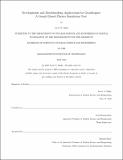Developments and benchmarking applications for Grasshopper : a Geant4 based physics simulation tool
Author(s)
Miske, Jacob N.
Download1191904092-MIT.pdf (512.6Kb)
Other Contributors
Massachusetts Institute of Technology. Department of Nuclear Science and Engineering.
Advisor
Areg Danagoulian.
Terms of use
Metadata
Show full item recordAbstract
Current particle physics simulations take place largely within small communities developing limited tools for specific areas of study. These particle simulations are essential to evaluating environments outside of the realm of experimentation in the radiation sciences. While multi-use toolkits exist for particles simulation (such as the popular MCNP or SRIM programs), these computational tools are often difficult for untrained users to adapt into their projects. Geant4 is one such toolkit that is used widely by physicists in radiology, fission reactor work, and space irradiation studies among many other fields. As it happens, Geant4 and related programming libraries are not the default program to install and use for scientific simulations by physicists or the general public interested in this work. However, a widely applicable simulation engine using Geant4, called Grasshopper, has been developed to allow for generating straightforward Monte Carlo simulations for engineers and scientists in a wide range of fields. This thesis evaluates Grasshopper with a series of benchmarks that show the software is able to accurately match empirical results. These benchmarks evaluate the accuracy of Grasshopper to run simulations involving alpha, proton, beta, gamma, and neutron radiation in the range of 1 MeV to beyond 100 MeV. By allowing users of Geant4 to easily generate these simulations, the time it takes to develop insights can now be reduced further with the increased efficiency from the use of these tools.
Description
Thesis: S.B., Massachusetts Institute of Technology, Department of Nuclear Science and Engineering, May, 2020 Cataloged from the official PDF of thesis. Includes bibliographical references (page 36).
Date issued
2020Department
Massachusetts Institute of Technology. Department of Nuclear Science and EngineeringPublisher
Massachusetts Institute of Technology
Keywords
Nuclear Science and Engineering.